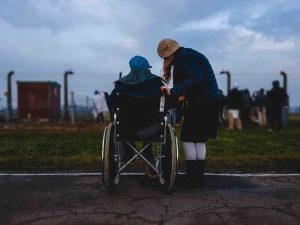 Whether nursing home patients reside at a skilled nursing facility in Escondido or elsewhere in California, they now have greater protections against elder abuse and neglect. According to a recent article in the Los Angeles Times, a new California state law requires that patients receive a minimum number of hours of care from certified nursing assistants (CNAs). The law took effect on July 1, 2018, but will patients see an immediate change in the way staffing works at nursing homes across the state? Will staffing increases reduce the rates of nursing home neglect in the state?
Whether nursing home patients reside at a skilled nursing facility in Escondido or elsewhere in California, they now have greater protections against elder abuse and neglect. According to a recent article in the Los Angeles Times, a new California state law requires that patients receive a minimum number of hours of care from certified nursing assistants (CNAs). The law took effect on July 1, 2018, but will patients see an immediate change in the way staffing works at nursing homes across the state? Will staffing increases reduce the rates of nursing home neglect in the state?
Staffing Requirements Stricter, But Will Facilities Meet Those Requirements?
Under the new law, what kinds of staffing requirements are required at nursing homes in Escondido and throughout California? As of July 1, facilities must provide each patient with at least 3.5 hours of direct care every day. This number increased from a previous requirement of 3.2 hours of direct patient care per day. But that change is not the most drastic of the shifts in the law. The significant change is that at least 2.4 of these daily hours of direct patient care must be provided by CNAs.
Enforcement of the law will not begin until July 1, 2019, but in the meantime facilities in California are scrambling to hire more CNAs in order to meet the requirements of the law. If a nursing home fails an investigation with regard to its staffing, the facility can face significant monetary fines of $15,000 and up to $30,000.
It should be easy for nursing homes to staff more CNAs, right? One of the problems is that there is a general shortage of these workers. Certified nursing assistants often are underpaid, they argue, for the long and difficult hours they put in. Indeed, California state data shows that CNAs in the state are only paid $13.96 per hour on average, which is only slightly above the minimum wage in California and often is less than what an employee earns at a Southern California retail job. As such, there is a shortage of CNAs in California if one looks at the number of seniors who currently need or will soon need daily care in a skilled nursing facility.
More Elderly Nursing Home Patients and Fewer CNAs
To be more precise in terms of the number of CNAs in California and the number of elderly nursing home patients who need daily care, the Los Angeles Times article highlights the following figures: approximately 32,000 CNAs in California currently provide services for about 100,000 nursing home patients. CNAs are tasked not only with helping seniors with activities of daily living, but also with providing certain medical services.
While nursing homes argue that the requirements of the new law are nearly impossible to meet given the shortage of CNAs in the state, advocates for patient care and nursing home safety argue that we need to do more to attract potential CNAs to these positions. Currently, in order to become a CNA, a person needs 100 clinical training hours and at least 60 classroom instruction hours. One way to increase the number of CNAs in the state might be to increase the number of skilled nursing facilities that offer these training programs in-house. And the California Department of Public Health already has provided funds for these programs to happen. California lawmakers are also considering legislation that would allow CNAs to meet their training and education requirements online.
The new law helps to ensure that nursing home patients receive the levels of care they need, but it may not be realistic in terms of the current number of CNAs in the state. Increasing options for CNA training, as well as advocating for fair employment terms for CNAs, may help to bring new healthcare providers into this area.
Contact an Escondido Nursing Home Abuse Attorney
Do you have concerns about nursing home neglect in Southern California? A dedicated Escondido nursing home neglect lawyer can speak with you today about options for your elderly loved one. Contact the Walton Law Firm to learn more.
See Related Blog Posts:
Nursing Homes Continue to Overmedicate Dementia Patients
Seniors With Cognitive Impairments Are More Likely to Fall
(image courtesy of Josh Appel)
 Southern California Nursing Home Abuse Lawyer Blog
Southern California Nursing Home Abuse Lawyer Blog








